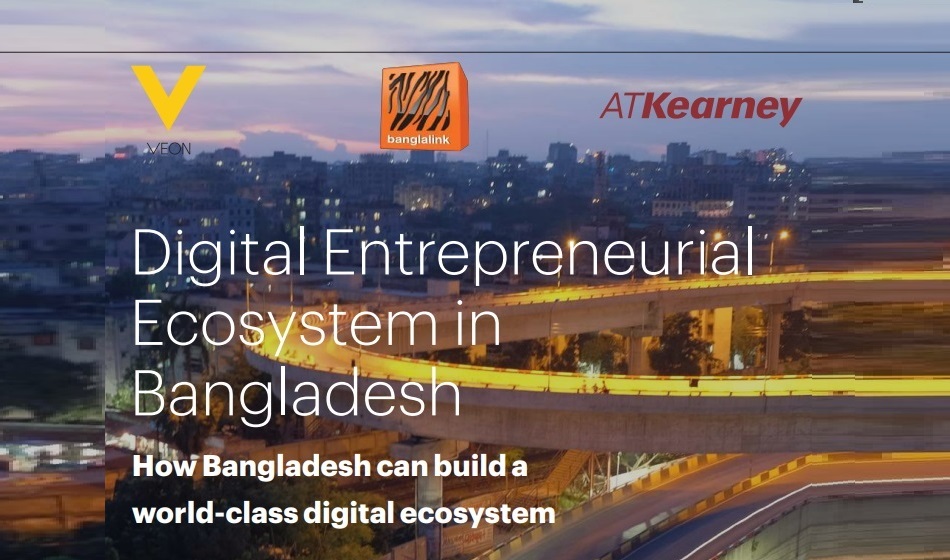
What makes Silicon Valley or Stockholm or Shanghai, or Bengaluru different from other cities in the world? What can Dhaka or other cities learn from these successful tech ecosystems? Take Stockholm, for instance, the Swedish city has produced some of the most successful and biggest technology companies in the world. In fact, with a population of less than 900,000, Stockholm produces the highest number of Unicorns per capita than any other city in the world after Silicon Valley. It is the birthplace of global tech brands like Skype, Spotify, Minecraft and Candy Crush Saga.
The expert like Professor Exequiel Hernandez of Wharton Business School says a number of factors have contributed to this development including a conducive “human, social, educational and corporate infrastructure that supports startups”. There is a lot to learn from the successful ecosystems like Stockholm about how to build a successful startup ecosystem.
To that end, Banglalink, one of the leading digital communications service providers in Bangladesh, has done something interesting and consequential for the digital ecosystem in Dhaka. It has recently released a report titled “Digital Entrepreneurial Ecosystem in Bangladesh” with an ambition to help “creating a vibrant digital economy” in Bangladesh.
The report, which is a result of a collaborative effort of Banglalink, its holding company VEON and global management consulting firm A.T. Kearney, explores underpinnings of building the foundation of the digital entrepreneurial ecosystem in Bangladesh and tries to find ‘the factors’ that would help Bangladesh to build a world-class digital entrepreneurial ecosystem.
The report comes in an interesting time when Bangladesh’s digital entrepreneurial ecosystem is going through a transformation of a sort.
Fueled by an expanding consumer market, a consistent economic growth, rising internet, and mobile phone penetration, Dhaka has a fast-growing digital entrepreneurial ecosystem. A rapidly maturing support system for digital entrepreneurs and a young population with an open mindset towards technology have resulted in the rise of a handful of local startups. Companies like Pathao, LCP, Pickaboo, Ajkerdeal and a handful other startups are doing good.
There are formidable challenges as well which one can easily notice in struggling startups, a slim number of success stories, and slow growth of the entrepreneurial ecosystem.
As the report observes, a dearth of technology talents aka programmers and the absence of industry and academia collaboration hurt talents and innovation. A challenging funding environment for the digital entrepreneurs makes it difficult to build internet companies. A lack of local and global business knowledge hampers overall growth.

As we observe in the case of Stockholm, a host of factors contributes to the growth of an entrepreneurial ecosystem. This is where the report comes in handy. It says it has identified a handful of factors that could help Dhaka in building a world-class digital entrepreneurial ecosystem.
Venture building is a long-tail job. The ultimate outcome depends on the number. The most successful ecosystems often produce a large number of companies. With the number, the chances of successful startups grow.
Bangladesh has seen an influx in the number of startups in the past few years, according to the report about 200 startups enter the market every year, but the number should grow further if we are to see major successes in the space. This is where ease of doing business is important. If doing business is difficult, many aspiring entrepreneurs would feel discouraged to start.
Starting a business remains a tedious job in Bangladesh. The stakeholder should pay sincere attention to further improve the ease of doing business in Bangladesh, says the report.
Fahim Mashroor, founder, and CEO of Bdjobs.com and Ajkerdeal goes a step further. In an interview with FS, he says “we need to formulate and implement entrepreneur-friendly policies so that people can start and build companies and create jobs for others.”
One of the persistent challenges for the local startups is limited access to finance. Internet startups require significant upfront investment to build the product and fuel initial growth.
If you look at the ecosystem like Bengaluru or Stockholm, one of the advantages startups enjoy is easy access to fund which is not the case in Bangladesh.
It is critical to building a favorable financing ecosystem for the early stage ventures. The report offers a number of suggestions including providing seed investment to startups that graduate from different incubator programs and creating a favorable environment for local and foreign funds alike to perform early-stage investment deals in Bangladesh.
Similarly, challenges also come from entrepreneurs side as well. A lack of understanding among startups regarding investment readiness hurts the ecosystem.
“Investment readiness of the potential companies is a concern,” said Shawkat Hossain, Managing Director of Venture Capital firm BD Venture Limited. Stakeholders should also make an active contribution to preparing founders and companies investment ready. Mr. Hossain also suggests that “information gap is a more critical problem than the lack of enough angel investors. We have no formal network of angel investors here. The absence of such an organized community actually deters a potential early-stage company to meet a desirous investor.”
Innovators need proper incentives to innovate. One of the incentives is, of course, your ability to enjoy the benefits of your innovation. But it is not possible to protect an innovation from getting copied if there is not proper IP protection in place.
The report identifies that there are real challenges around protecting IP in Bangladesh which discourages many entrepreneurs and innovators from investing in coming up with new innovations.
Contrary to that, in advanced markets, it is easy to protect and get benefits out of your innovation. In order to promote innovation, it is important that proper IP protection is in place.
Coworking space, incubators, and innovation centers - these are the critical support infrastructures that help startups to grow. The number of coworking spaces and incubator programs has a lot to do with the number of successful startups in an ecosystem.
Take, for instance, China and the US, the two most successful tech startup ecosystem, have over 2,400 and 1,500 incubators and accelerators, respectively. Our neighboring country India has over 140 incubators and accelerators. Compared to that, our number is painfully slim.
The report cites the existing initiatives in the space such as ICT Division has launched a handful of initiatives such a venture fund competitions and several programs to support startups and a few existing co-working spaces and incubator programs.
Banglalink also runs a program in collaboration with the ICT Division of the government where startups receive a variety of supports starting from free workspace to mentorship to access to market facilities.
The report suggests there need to be more initiatives in-line with building the infrastructure so that startups can get the support they need.
Access to market is a challenge many startups face.
Corporates and successful businesses can play an important role in filling this gap in the market, says the report.
It suggests corporates can provide marketing and distribution support to startups as a part of incubation and acceleration programs and develop easy and clear processes for commercial partnerships with startups can help both the startups and the corporations.
Bangladesh lacks tech talents, which prohibits the growth of the industry, observes the report.
At the same time, there is an absence of industry-academia collaboration leading to a mismatch in demand and supply of talents.
A significant percent of entrepreneurs participated in the study, observes the report, said that “universities do not support a spirit of collaboration and entrepreneurship. Furthermore, a lack of understanding of the business landscape and limited business acumen is holding back first-time entrepreneurs, who complain that universities do not provide efficient business courses or sufficient support for entrepreneurship.”
Industry insiders acknowledge this challenge. Shawkat Hossain of BD Venture says, “there’s no denying that lack of IT professionals is a huge obstacle to technological advancement. In this respect, I think universities are failing to meet the industry demands. They are still following the old-fashioned curricula whereas the present skill-needs of the industry are totally different.
If the academia doesn’t pay heed to the real business world, we could have a serious crisis up ahead. Similarly, there should be well thought-out plans from the industry as well. A concerted effort can provide a solution to this stagnation,” he concludes.
Given the socio-economic reality in Dhaka, entrepreneurship is imperative for national development. “Bangladesh needs a vibrant digital ecosystem to diversify and strengthen its economy, boost exports, create jobs for its large population of young people, and improve public services, such as healthcare and education”, says the report.
The startup scene in Dhaka is starting to gel and the next generation of Bangladeshi tech companies is beginning to join the movement. Naturally, there will be more startups in the coming days. “Bangladesh has a youthful population that is eager to embrace digital services, while average consumer spending is rising 11 percent annually (reaching US$1,015 in 2016)”.
The opportunity is endless. “The market has a lot to offer and we just need to work a little harder on understanding that needs and go accordingly,” says Fahim Mashroor, Founder, and CEO, Bdjobs.com and Ajkerdeal.com.
The report offers an excellent insight into the burgeoning digital entrepreneurial ecosystem in Bangladesh and path forward for the country. You may download the full report here.
-
(Disclosure: this is an editorially independent branded content prepared by Storylab, Future Startup’s in-house branded content studio, in collaboration with Banglalink Digital’s CR Team.)
